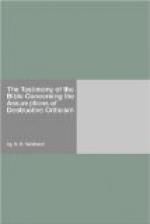When Paul was writing to the Corinthians of the blindness of the Jews (2 Cor. iii. 15) he said: “Even unto this day, when Moses is read, the veil is upon their hearts.”
Moses must have written something if he was read. What has become of his writings? Is it not the Pentateuch which the Scriptures everywhere call the writings of Moses? Undoubtedly, yes.
In Paul’s missionary sermon at Antioch in Pisidia, he declared to his audience that through Christ “all that believe are justified from all things, from which ye could not be justified by the law of Moses” (Acts xiii. 39).
Why does Paul refer to the ceremonial of the Jewish ritual as the law of Moses? It must be answered that Paul was a Jew. He was familiar with the Jewish scriptures. He had read the following passages and believed them, and was grounded in the truth which they declare, that “by the hand of Moses” they were given to the people.
To satisfy the reader that they were “given by the hand of Moses” the following Scriptures are furnished:
1. “Aaron and his sons did all things which were commanded by the hand of Moses.” (Lev. viii. 36.)
2. “That ye may teach the children of Israel all the statutes which the Lord hath spoken unto them by the hand of Moses.” (Lev. x. 11.)
3. “These are the statutes and judgments and laws which the Lord made between him and the children of Israel in Mount Sinai, by the hand of Moses.” (Lev. xxvi. 46.)
4. “These were they that were numbered of the families of the Kohathites, all that might do service in the tabernacle of the congregation, which Moses and Aaron did number, according to the commandment of the Lord by the hand of Moses.” (Num. iv. 37.)
5. “These ... whom Moses and Aaron numbered, according to the word of the Lord by the hand of Moses.” (Num. iv. 45.)
6. “According to the commandment of the Lord they were numbered by the hand of Moses.” (Num. iv. 49.)
7. “They kept the charge of the Lord, at the commandment of the Lord, by the hand of Moses.” (Num. ix. 23.)
8. “And they first took their journey according to the commandment of the Lord by the hand of Moses.” (Num. x. 13.)
9. “Even all that the Lord hath commanded you by the hand of Moses, from the day that the Lord commanded Moses.” (Num. xv. 23.)
10. “That no stranger, which is not of the seed of Aaron, come near to offer incense before the Lord, that he be not as Kora and his company, as the Lord said to him by the hand of Moses.” (Num. xvi. 40.)
11. “And he laid his hands upon him, and gave him a charge, as the Lord commanded by the hand of Moses.” (Num. xxvii. 23.)
12. “These are the commandments and the judgments which the Lord commanded by the hand of Moses.” (Num. xxxvi. 13.)




